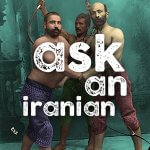
There are languages you know you speak, and there are bits of other languages that you don’t know you speak. New concepts arrive; those concepts get coined, and as and when they get used elsewhere, we see languages evolve. To give yourself an example, simply try speaking English, without using Latin, Greek or, heaven forbid, French. The embryonic stages of this phenomena can be referred to as code-switching. This is the term used to describe somebody alternating between languages among other similarly speaking polyglots. Adding new concepts is just one of many reasons for code-switching, however. Adding flare to conversations is maybe the main usage among polyglots, but there are many other reasons why “hamash” Iranians code-switch “mikoneh”.
To help us out with this fascinating subject, we invited an American-based user-interface designer, secretly known as Reza. He not only joined us to discuss the reasons why people code-switch but joined us in listening to the many peculiar examples provided by our listeners. If you’re curious as to how and why Iranians code-switch between Persian and English, read more here.
Questions that we also get answers to in this episode
- Is there a government department to counter code-switching in Iran?
- What English words are most commonly used by Iranians?
- How much do Iranians code-switch?
- Do Iranians code-switch more than other peoples?
- Why do the Dutch gamers code-switch so much?
- Why do Iranians do this alliterative thing with words, like “chips mips”?
- Why is the word “relationship”, preferred over the Persian equivalent?
- Do Iranians “have sex” or “do sex”?
Music credit: “Mahvash, Parivash”, Jalal Hemmati | “Rule Britannia (Euro Dance House Techno 90s Version)”, Ben Coleman
Image credit: “Liquid”, 2014, courtesy of Faig Ahmed Studio, edited by Ask An Iranian 2021.
Read more and find the links on ASKANIRANIAN.COM
Check the merchandise out on ASKANIRANIAN.COM/SHOP

Leave a Reply